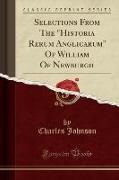Read more
Excerpt from Selections From The "Historia Rerum Anglicarum" Of William Of Newburgh
We can picture our author leading a quiet, perhaps even an invalid life, reading or writing on the sunny side of the Cloister of his own house, or visiting the libraries of the neighbouring abbeys and of the cathedral at York, when day light served and the weather was warm enough, or sitting by the fire in the guest - house talking politics and listening to, travellers' tales. But his main interest for us lies in the character of his own mind. He was no mere copyist he had a style of his own which transformed his materials SO much that he seldom repeats the words of the authority which he follows. Moreover, he re¿ected on what he 'read, and his strictures on the romances of Geoffrey of Monmouth show that he was capable of sound historical criticism, in\ which he was some centuries before his time. Not less striking, to a modern reader, is the credulity with which he repeats the marvellous legends which he heard from his neighbours. But it must be remembered that the stories which he relates are such as were at that time generally accepted on the authority of eye-witnesses, and, as the experience of our own age sufficiently proves, there is no limit to what Will bè believed, even by men of the highest intelligence, when a class of phenomena is exempted from the ordinary canons of Scientific criticism. Thus, William tests historical statements by sound historical rules, but has no canons to apply to what is frankly recognized as supernatural.
About the Publisher
Forgotten Books publishes hundreds of thousands of rare and classic books. Find more at www.forgottenbooks.com
This book is a reproduction of an important historical work. Forgotten Books uses state-of-the-art technology to digitally reconstruct the work, preserving the original format whilst repairing imperfections present in the aged copy. In rare cases, an imperfection in the original, such as a blemish or missing page, may be replicated in our edition. We do, however, repair the vast majority of imperfections successfully; any imperfections that remain are intentionally left to preserve the state of such historical works.

